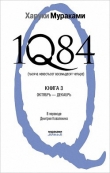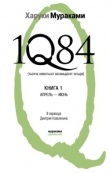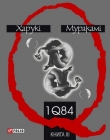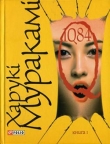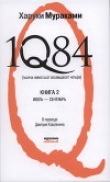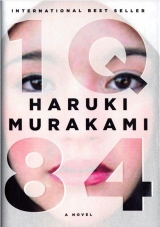
Текст книги "1q84"
Автор книги: Haruki Murakami
Жанр:
Современная проза
сообщить о нарушении
Текущая страница: 28 (всего у книги 81 страниц)
“Which is why I said I hoped you wouldn’t be annoyed.”
“Yes, I heard you say that.”
“Sorry, but I couldn’t think of anyone besides you I could ask.”
Tamaru made a small, strangled sound in the back of his throat that could well have been the suppression of a sigh. “Now, just supposing that I were in a position to provide you with what you are asking for, common sense tells me that I would probably want to ask you this: Whom do you intend to shoot?”
Aomame pointed her index finger toward her own temple. “Right here, probably.”
Tamaru stared at the finger expressionlessly for a moment. “My next question would probably be, ‘Why?’ ”
“Because I don’t want to be captured,” Aomame said. “I’m not afraid to die. And although I probably wouldn’t like it, I could tolerate going to prison. But I refuse to be held hostage and tortured by some unknown bunch of people. I just don’t want to give away anybody’s name. Do you see what I am saying?”
“I think I do.”
“I don’t plan to shoot anybody or to rob a bank. So I don’t need some big, twenty-shot semiautomatic. I want something compact without much kick.”
“A drug would be another option. It’s more practical than trying to get ahold of a gun.”
“Taking out a drug and swallowing it would take time. Before I could crush a capsule in my teeth, somebody might stick a hand in my mouth and stop me. With a gun, I could hold the other person off while I took care of things.”
Tamaru thought about this for a moment, his right eyebrow slightly raised.
“I’d rather not lose you, if I can help it,” he said. “I kind of like you. Personally, that is.”
Aomame gave him a little smile. “For a human female, you mean?”
Without changing his expression, Tamaru said, “Male, female, human, dog—I don’t have that many individuals I’m fond of.”
“No, of course not,” Aomame said.
“At the same time, my single most important duty is protecting Madame’s health and safety. And I’m—what should I say?—kind of a pro.”
“That goes without saying.”
“So let me see what I can do. I can’t guarantee anything, but I might be able to find somebody I know who can respond to your request. This is a very delicate business, though. It’s not like buying an electric blanket by mail order. It might take a week before I can get back to you.”
“That would be fine,” Aomame said.
Tamaru squinted up at the trees where the cicadas were buzzing. “I hope everything goes well. I’ll do whatever I can, within reason.”
“Thanks, Tamaru. This next job will probably be my last. I might never see you again.”
Tamaru spread his arms, palms up, as if he were standing in a desert, waiting for the rain to fall, but he said nothing. He had big, fleshy palms marked with scars. His hands looked more like parts of a giant machine than of a human body.
“I don’t like good-byes,” Tamaru said. “I didn’t even have a chance to say good-bye to my parents.”
“Are they dead?”
“I don’t know whether they’re alive or dead. I was born on Sakhalin Island the year before the war ended. The south end of Sakhalin was a Japanese territory called Karafuto, but the Soviets occupied it, and my parents were taken prisoner. My father apparently had some kind of job with the harbor facilities. Most of the Japanese civilian prisoners were returned to Japan soon enough, but my parents couldn’t go to Japan because they were Koreans who had been sent to Sakhalin as laborers. The Japanese government refused to take them. Once Japan lost the war, Koreans were no longer subjects of the empire of Japan. It was terrible. The government didn’t have a shred of sympathy for them. They could have gone to North Korea if they wanted to, but not to the South, because the Soviet Union at the time didn’t recognize the existence of South Korea. My parents came from a fishing village near Pusan and had no desire to go to the North. They had no relatives or friends up there. I was still a baby. They put me in the hands of a couple being repatriated to Japan, and those people took me across the straits to Hokkaido. The food situation in Sakhalin at the time was horrendous, and the Soviet army’s treatment of their prisoners was terrible. My parents had other small children and must have figured it would be hard to bring me up there. They probably figured they would send me over to Hokkaido first and join me later. Or maybe it was just an excuse to get rid of me. I don’t know the details. In any case, we were never reunited. They’re probably still in Sakhalin to this day—assuming they haven’t died yet.”
“You don’t remember them?”
“Not a thing. I was just a little over a year old when we separated. The couple kept me for a while and then sent me to a facility for orphans in the mountains near Hakodate, way down near the southern tip of Hokkaido, about as far as you could go from Sakhalin and still be on Hokkaido. They probably couldn’t afford to keep me. Some Catholic organization ran the orphanage, which was a very tough place. There were tons of orphans after the war, and not enough food or heat for them all. I had to do all kinds of things to survive.” Tamaru glanced down at the back of his right hand. “So an adoption was arranged for form’s sake, I became a Japanese citizen, and got a Japanese name: Ken’ichi Tamaru. All I know about my original name is the surname: Park—and there are as many Koreans named ‘Park’ as there are stars in the sky.”
Sitting side by side with Tamaru, Aomame listened to the cries of the cicadas.
“You should get another dog,” Aomame said.
“Madame says so too. The safe house needs another guard dog, at least. But I just don’t feel like it yet.”
“I understand. But you should get one. Not that I’m in any position to be advising people.”
“I will,” Tamaru said. “We do need a trained guard dog, in the end. I’ll get in touch with a breeder right away.”
Aomame looked at her watch and stood up. There was still some time left until sunset, but already a hint of evening marked the sky—a different blue mixed in with the blue of the afternoon. She could feel some of the lingering effects of the sherry. Could the dowager still be sleeping?
“According to Chekhov,” Tamaru said, rising from his chair, “once a gun appears in a story, it has to be fired.”
“Meaning what?”
Tamaru stood facing Aomame directly. He was only an inch or two taller than she was. “Meaning, don’t bring unnecessary props into a story. If a pistol appears, it has to be fired at some point. Chekhov liked to write stories that did away with all useless ornamentation.”
Aomame straightened the sleeves of her dress and slung her bag over her shoulder. “And that worries you—if a pistol comes on the scene, it’s sure to be fired at some point.”
“In Chekhov’s view, yes.”
“So you’re thinking you’d rather not hand me a pistol.”
“They’re dangerous. And illegal. And Chekhov is a writer you can trust.”
“But this is not a story. We’re talking about the real world.”
Tamaru narrowed his eyes and looked hard at Aomame. Then, slowly opening his mouth, he said, “Who knows?”
CHAPTER 2
Tengo
I DON’T HAVE A THING EXCEPT MY SOUL
He set his recording of Janáček’s Sinfonietta on the turntable and pressed the “auto-play” button. Seiji Ozawa conducting the Chicago Symphony. The turntable started to spin at 33⅓ RPM, the tonearm moved over the edge of the record, and the needle traced the groove. Following the brass introduction, the ornate timpani resounded from the speakers. It was the section that Tengo liked best.
While listening to the music, Tengo faced the screen of his word processor and typed in characters. It was a daily habit of his to listen to Janáček’s Sinfonietta early in the morning. The piece had retained a special significance for him ever since he performed it as an impromptu high school percussionist. It gave him a sense of personal encouragement and protection—or at least he felt that it did.
He sometimes listened to Janáček’s Sinfonietta with his older girlfriend. “Not bad,” she would say, but she liked old jazz records more than classical—the older the better. It was an odd taste for a woman her age. Her favorite record was a collection of W. C. Handy blues songs, performed by the young Louis Armstrong, with Barney Bigard on clarinet and Trummy Young on trombone. She gave Tengo a copy, though less for him than for herself to listen to.
After sex, they would often lie in bed listening to the record. She never tired of it. “Armstrong’s trumpet and singing are absolutely wonderful, of course, but if you ask me, the thing you should concentrate on is Barney Bigard’s clarinet,” she would say. Yet the actual number of Bigard solos on the record was small, and they tended to be limited to a single chorus. Louis Armstrong was the star of this record. But she obviously loved those few Bigard solos, the way she would quietly hum along with every memorized note.
She said she supposed there might be more talented jazz clarinetists than Barney Bigard, but you couldn’t find another one who could play with such warmth and delicacy. His best performances always gave rise to a particular mental image. Tengo could not, off the top of his head, name any other jazz clarinetists, but as he listened to this record over and over, he began to appreciate the sheer, unforced beauty of its clarinet performances—their richly nourishing and imaginative qualities. He had to listen closely and repeatedly for this to happen, and he had to have a capable guide. He would have missed the nuances on his own.
His girlfriend once said, “Barney Bigard plays beautifully, like a gifted second baseman. His solos are marvelous, but where he really shines is in the backup he gives the other musicians. That is so hard, but he does it like it’s nothing at all. Only an attentive listener can fully appreciate his true worth.”
Whenever the sixth tune on the flip side of the LP, “Atlanta Blues,” began, she would grab one of Tengo’s body parts and praise Bigard’s concise, exquisite solo, which was sandwiched between Armstrong’s song and his trumpet solo. “Listen to that! Amazing—that first, long wail like a little child’s cry! What is it—surprise? Overflowing joy? An appeal for happiness? It turns into a joyful sigh and weaves its way through a beautiful river of sound until it’s smoothly absorbed into some perfect, unknowable place. There! Listen! Nobody else can play such thrilling solos. Jimmy Noone, Sidney Bechet, Pee Wee Russell, Benny Goodman: they’re all great clarinetists, but none of them can create such perfectly sculptured works of art.”
“How come you know so much about old-time jazz?” Tengo once asked.
“I have lots of past lives that you don’t know anything about—past lives that no one can change in any way,” she said, gently massaging Tengo’s scrotum with the palm of her hand.
When he was finished writing for the morning, Tengo walked to the station and bought a paper at the newsstand. This he carried into a nearby café, where he ordered a “morning set” of buttered toast and a hard-boiled egg. He drank coffee and opened the paper while waiting for his food to come. As Komatsu had predicted, there was an article about Fuka-Eri on the human interest page. Not very large, the article appeared above an ad for Mitsubishi automobiles, under the headline “Popular High School Girl Writer Runaway?”
Fuka-Eri (penname of Eriko Fukada, 17), author of the current bestseller Air Chrysalis, has been listed as missing, it was revealed yesterday afternoon. According to her guardian, cultural anthropologist Takayuki Ebisuno (63), who filed the search request with the Oume police station, Eriko has failed to return either to her home in Oume City or to her Tokyo apartment since the night of June 27, and there has been no word from her since then. In response to this newspaper’s telephone inquiry, Mr. Ebisuno said that Eriko was in her usual good spirits when he last saw her, that he could think of no reason she would want to go into hiding, that she had never once failed to come home without permission, and that he is worried something might have happened to her. The editor in charge of Air Chrysalis at the ** publishing company, Yuji Komatsu, said, “The book has been at the top of the bestseller list for six straight weeks and has garnered a great deal of attention, but Miss Fukada herself has not wanted to make public appearances. We at the company have been unable to determine whether her current disappearance might have something to do with her attitude toward such matters. While young, Miss Fukada is an author with abundant talent from whom much can be expected in the future. We hope that she reappears in good health as soon as possible.” The police investigation is proceeding with several possible leads in view.
That was probably about as much as the newspapers could say at this stage, Tengo concluded. If they gave it a more sensational treatment and Fuka-Eri showed up at home two days later as if nothing had happened, the reporter who wrote the article would be embarrassed and the newspaper itself would lose face. The same was true for the police. Both issued brief, neutral statements like weather balloons to see what would happen. The story would turn big once the weekly magazines got ahold of it and the TV news shows turned up the volume. That would not happen for a few more days.
Sooner or later, though, things would heat up, that was for certain. A sensation was inevitable. There were probably only four people in the world who knew that she had not been abducted but was lying low somewhere, alone. Fuka-Eri herself knew it, of course, and Tengo knew it. Professor Ebisuno and his daughter Azami also knew it. No one else knew that the fuss over her disappearance was a hoax meant to attract broad attention.
Tengo could not decide whether his knowledge of the truth was something he should be pleased or upset about. Pleased, probably: at least he didn’t have to worry about Fuka-Eri’s welfare. She was in a safe place. At the same time it was also clear that Tengo was complicit in this complicated plot. Professor Ebisuno was using it as a lever, in order to pry up an ominous boulder and let the sunlight in. Then he would wait to see what crawled out from under the rock, and Tengo was being forced to stand right next to him. Tengo did not want to know what would crawl out from under the rock. He would prefer not to see it. It was bound to be a huge source of trouble. But he sensed he would have no choice but to look.
After he had drunk his coffee and eaten his toast and eggs, Tengo exited the café, leaving his rumpled newspaper behind. He went back to his apartment, brushed his teeth, showered, and prepared to leave for school.
. . .
During the noon break at the cram school, Tengo had a strange visitor. He had just finished his morning class and was reading a few of the day’s newspapers in the teachers’ lounge when the school director’s secretary approached him and said there was someone who wanted to see him. The secretary was a capable woman one year older than Tengo who, in spite of her title, handled virtually all of the school’s administrative business. Her facial features were a bit too irregular for her to be considered beautiful, but she had a nice figure and marvelous taste in clothes.
“He says his name is Mr. Ushikawa.”
Tengo did not recognize the name.
For some reason, a slight frown crossed her face. “He says he has ‘something important’ to discuss with you and wants to see you alone if possible.”
“Something important?” Tengo asked, taken aback. No one ever brought him “something important” to discuss at the cram school.
“The reception room was empty, so I showed him in there. Teachers aren’t supposed to use that room without permission, but I figured …”
“Thanks very much,” Tengo said, and gave her his best smile.
Unimpressed, she hurried off somewhere, the hem of her new agnès b. summer jacket flapping in the breeze.
Ushikawa was a short man, probably in his mid-forties. His trunk had already filled out so that it had lost all sign of a waist, and excess flesh was gathering at his throat. But Tengo could not be sure of his age. Owing to the peculiarity (or the uncommonness) of his appearance, the clues necessary for guessing his age were difficult to find. He could have been older than that, or he could have been younger—anywhere between, say, thirty-two and fifty-six. His teeth were crooked, and his spine was strangely curved. The large crown of his head formed an abnormally flat bald area with lopsided edges. It was reminiscent of a military heliport that had been made by cutting away the peak of a small, strategically important hill. Tengo had seen such a heliport in a Vietnam War documentary. Around the borders of the flat, lopsided area of his head clung thick, black, curly hair that had been allowed to grow too long, hanging down shaggily over the man’s ears. Ninety-eight people out of a hundred would probably be reminded by it of pubic hair. Tengo had no idea what the other two would think.
Everything about the man—his face, his body—seemed to have been formed asymmetrically. Tengo noticed this right away. Of course, all people’s bodies are asymmetrical to some extent: that in itself was not contrary to the laws of nature. Tengo himself was aware that his own two eyelids had slightly different shapes, and his left testicle hung slightly lower than the right one. Our bodies are not mass-produced in a factory according to fixed standards. But in this man’s case, the differences between right and left went far beyond the bounds of common sense. This imbalance, obvious to any observer, could not help but annoy those in his presence and cause them the same kind of discomfort they would feel in front of a funhouse mirror.
The man’s gray suit had countless tiny wrinkles, which made it look like an expanse of earth that had been ground down by a glacier. One flap of his white dress shirt’s collar was sticking out, and the knot of his tie was contorted, as if it had twisted itself from the sheer discomfort of having to exist in that place. The suit, the shirt, and the tie were all slightly wrong in size. The pattern on his tie might have been an inept art student’s impressionistic rendering of a bowl of tangled, soggy noodles. Each piece of clothing looked like something he had bought at a discount store to fill an immediate need. But the longer Tengo studied them, the sorrier he felt for the clothes themselves, for having to be worn by this man. Tengo paid little attention to his own clothing, but he was strangely concerned about the clothing worn by others. If he had to compile a list of the worst dressers he had met in the past ten years, this man would be somewhere near the top. It was not just that he had terrible style: he also gave the impression that he was deliberately desecrating the very idea of wearing clothes.
When Tengo entered the reception room, the man stood and produced a business card from his card case, handing it to Tengo with a bow. “Toshiharu Ushikawa,” it said in both Japanese characters and Roman script. An ordinary enough first name, but “Ushikawa”? “Bull River”? Tengo had never seen that one before. The card further identified the man as “Full-time Director, New Japan Foundation for the Advancement of Scholarship and the Arts,” located downtown in Kojimachi, Chiyoda Ward, and gave the foundation’s telephone number. Tengo had no idea what kind of organization the New Japan Foundation for the Advancement of Scholarship and the Arts might be, nor what it meant to be a “full-time director” of anything. The business card, though, was a handsome one, with an embossed logo, not a makeshift item. Tengo studied it for several moments before looking at the man again. He felt sure there could not be many people in the world whose appearance was so out of keeping with the grandiose title “Full-time Director, New Japan Foundation for the Advancement of Scholarship and the Arts.”
They sat in easy chairs on opposite sides of a low table and looked at each other. The man gave his sweaty forehead a few vigorous rubs with a handkerchief and returned the pitiful cloth to his jacket pocket. The receptionist brought in two cups of green tea on a tray. Tengo thanked her as she left.
Ushikawa said nothing to her, but to Tengo he said, “Please forgive me for interrupting your break and for arriving without having first made an appointment.” The words themselves were polite and formal enough, but his tone was strangely colloquial, and Tengo found it almost offensive. “Have you finished lunch? If you like, we could go out and talk over a meal.”
“I don’t eat lunch when I’m working,” Tengo said. “I’ll have something light after my afternoon class, so don’t worry.”
“I see. Well, then, with your permission, I’ll tell you what I have in mind and we can discuss it here. This seems like a nice, quiet place where we can talk without interruption.” He surveyed the reception room as though appraising its value. There was nothing special about the room. It had one big oil painting hanging on the wall—a picture of some mountain, more impressive for the weight of its paint than anything else. A vase had an arrangement of flowers resembling dahlias—dull blossoms reminiscent of a slow-witted matron. Tengo wondered why a cram school would keep such a gloomy reception room.
“Let me belatedly introduce myself. As you can see from the card, my name is Ushikawa. My friends all call me ‘Ushi,’ never ‘Ushikawa.’ Just plain, old ‘Ushi,’ as if I were a bull,” Ushikawa said, smiling.
Friends? Tengo wondered—out of pure curiosity—what kind of person would ever want to be this man’s friend.
On first impression, Ushikawa honestly made Tengo think of some creepy thing that had crawled out of a hole in the earth—a slimy thing of uncertain shape that in fact was not supposed to come out into the light. He might conceivably be one of the things that Professor Ebisuno had lured out from under a rock. Tengo unconsciously wrinkled his brow and placed the business card, which was still in his hand, on the table. Toshiharu Ushikawa. That was this man’s name.
“I am sure that you are very busy, Mr. Kawana, so with your permission I will abbreviate any preliminary background and proceed directly to the heart of the matter,” Ushikawa said.
Tengo answered with a little nod.
Ushikawa took a sip of tea and launched into the business at hand. “You have probably never heard of the New Japan Foundation for the Advancement of Scholarship and the Arts, Mr. Kawana.” Tengo nodded. “We are a relatively new foundation that concentrates on selecting and supporting young people—especially those young people who are not yet widely known—who are engaged in original activity in the fields of scholarship and the arts. In other words, our aim is to nourish the budding youth who will carry the next generation on their shoulders in all fields of Japan’s contemporary culture. We contract with specialists to propose candidates for us in each category. We choose five artists and scholars each year and provide them with grants. They can do anything they like for one year, no strings attached. All we ask is that they submit a simple report at the end of their year—a mere formality—outlining their activities and results, to be included in the foundation’s magazine. Nothing more burdensome than that. We have just begun this activity, so the important thing for us is to produce tangible results. We are, in other words, still in the seed-planting stage. In concrete terms, what this means is that we will provide each recipient with an annual stipend of three million yen.”
“Very generous,” Tengo said.
“It takes both time and money to build up or discover something important. Of course, time and money are not in themselves a guarantee of great results, but they can’t hurt. The total amount of time available is especially limited. The clock is ticking as we speak. Time rushes past. Opportunities are lost right and left. If you have money, you can buy time. You can even buy freedom if you want. Time and freedom: those are the most important things that people can buy with money.”
Hearing this, Tengo almost reflexively glanced at his watch. True, time was ticking past without a letup.
“Sorry for taking so much of your time,” Ushikawa added, obviously interpreting Tengo’s gesture as a demonstration of his own argument. “Let me be quick about this. These days, of course, a mere three million yen is not going to enable a lavish lifestyle, but it ought to help a young person pay the bills very nicely. Which is our basic purpose: to make it possible for recipients to spend a full year concentrating on their research or creative projects without struggling to support themselves. And if the governing board determines at the end-of-year evaluation that the person produced noteworthy results during the period, the possibility remains for the stipend to be extended beyond the single year.”
Tengo said nothing but waited for Ushikawa to continue.
“The other day I took the liberty of listening to you lecture for a full hour here at the cram school, Mr. Kawana. Believe me, I found it very interesting. I am a total outsider when it comes to mathematics, or should I say I’ve always been terrible at it and absolutely hated math class in school. I just had to hear the word ‘mathematics’ to start writhing in agony and to run away as far as I could. But your lecture, Mr. Kawana, was utterly enjoyable. Of course, I didn’t understand a thing about the logic of calculus, but just listening to you speak about it, I thought, if it’s really so interesting, I ought to start studying math. You can be proud of yourself. You have a special talent—a talent for drawing people in, should I say. I had heard that you were a popular teacher, and I could see why.”
Tengo had no idea when or where Ushikawa could have heard him lecture. He always paid close attention to who was in the room when he was teaching, and though he had not memorized every student’s face, he could never have missed anyone as strange-looking as Ushikawa, who would have stood out like a centipede in a sugar bowl. He decided not to pursue the matter, however, which would only have prolonged a conversation that was already too long.
“As you must know, Mr. Ushikawa, I’m just an employee here, somebody the cram school hires to teach a few courses,” Tengo began, anxious to waste as little time as possible. “I don’t do any original research in mathematics. I just take knowledge that is already out there and explain it to students as simply and entertainingly as I can. All I’m doing is teaching them more effective methods for solving problems on college placement tests. I may have a certain talent for that, but I gave up the idea of being a professional researcher in the field a long time ago. For one thing, I couldn’t afford to stay in school any longer, and I never thought I had the aptitude or the ability to make a name for myself in the academic world. In that sense, I’m just not the kind of person you’re looking for.”
Ushikawa hurriedly raised his hand. “No, that’s not what I’m getting at at all. I’m sorry, I might have made this more complicated than it has to be. It’s true that your math lectures are interesting and unique and original. But I didn’t come here today about that. What we have our eye on, Mr. Kawana, is your activity as a novelist.”
Tengo was so unprepared for this that he was momentarily at a loss for words.
“My activity as a novelist?”
“Exactly.”
“I don’t understand. It’s true, I’ve been writing fiction for several years, but nothing of mine has ever been published. You can’t call someone like that a novelist. How could I have possibly attracted your attention?”
At Tengo’s reaction, Ushikawa smiled in great delight, revealing a mouthful of horribly crooked teeth. Like seaside pilings that had been hit by huge waves, they pointed off in all directions and were befouled in a great many ways. They were surely beyond help from orthodontia, but someone should at least teach him how to brush his teeth properly, Tengo thought.
“That’s what makes our foundation unique,” Ushikawa said proudly. “The researchers we contract with take note of things that other people have yet to notice. That is one of our goals. As you say, none of your work has been properly published, and we are quite aware of that. But we also know that, under a penname, you have entered various literary magazines’ new writer’s competitions almost every year. You have not won yet, unfortunately, but a few times your work made it through to the last stage of the screening process, so that, quite naturally, a not inconsiderable number of people got to read them, and several of those people took note of your talent. Our researcher has concluded that you are certain to win a new writer’s award in the near future and make your debut as a writer. ‘Investing in futures’ would be a rather crude way to put it, but as I said before, our aim is to ‘nourish the budding youth who will carry the next generation on their shoulders.’ ”
Tengo picked up his cup and took a drink of his tea, which, by now, was somewhat cool. “So, what you’re saying is that I’m a candidate for a grant as a fledgling novelist, is that it?”
“That is it exactly. Except that you’re not so much a candidate as a finalist. If you say that you are willing to accept the grant, then I am authorized to finalize the arrangements. If you will be so good as to sign the necessary documents, the three million yen will be transferred electronically into your bank account immediately. You will be able to take six months or a year’s leave from this cram school and devote all your energies to writing. We have heard that you are presently writing a long novel. This would be a perfect opportunity, don’t you think?”
“How do you know I’m writing a long novel?” Tengo asked with a frown.
Ushikawa gave him another toothy grin, but upon closer inspection, Tengo realized that his eyes were not smiling at all. The glow from them was icy cold.
